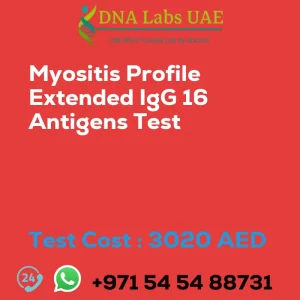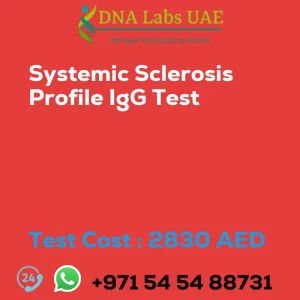IMMUNE DEFICIENCY PANEL 5 Test
Test Name: IMMUNE DEFICIENCY PANEL 5 Test
Components: *CD3*CD19 Includes % and Absolute Counts
Price: 610.0 AED
Sample Condition: 3 mL (2 mL min.) whole blood in 1 Lavender Top (EDTA) tube AND 3 mL (2 mL min.) whole blood in 1 Green Top (Sodium Heparin) tube. Ship immediately at 18-22°C. DO NOT REFRIGERATE OR FREEZE. Specify time, date and clinical details on test request form.
Report Delivery: Sample Daily by 9 am; Report Same day
Method: Flow Cytometry
Test type: Immunodeficiency states
Doctor: Hematologist
Test Department: FLOW CYTOMETRY
Pre Test Information: Give brief clinical history.
Test Details
The Immune Deficiency Panel 5 test is a comprehensive panel that evaluates the function and activity of the immune system. It assesses various components of the immune system to identify any deficiencies or abnormalities that may be affecting the body’s ability to fight off infections and diseases. The panel typically includes the following tests:
- Immunoglobulin G (IgG) levels: IgG is the most abundant antibody in the body and plays a crucial role in fighting off infections. Low levels of IgG may indicate an immune deficiency.
- Immunoglobulin A (IgA) levels: IgA is primarily found in the mucous membranes and helps protect against infections in the respiratory and gastrointestinal tracts. Low levels of IgA may indicate an increased susceptibility to respiratory and gastrointestinal infections.
- Immunoglobulin M (IgM) levels: IgM is the first antibody produced during an infection. Low levels of IgM may suggest an impaired ability to mount an initial immune response to new infections.
- Complete blood count (CBC): A CBC measures various components of the blood, including white blood cells, red blood cells, and platelets. Abnormalities in these cell counts may indicate an immune disorder.
- T-cell subset analysis: This test evaluates the different types of T-cells in the immune system, including CD4+ T-cells and CD8+ T-cells. Imbalances in these T-cell subsets may suggest an immune deficiency.
The Immune Deficiency Panel 5 test is often ordered by healthcare providers when there is a suspicion of immune system dysfunction or recurrent infections. The results can help guide further diagnostic investigations and treatment plans for individuals with immune deficiencies.
| Test Name | IMMUNE DEFICIENCY PANEL 5 Test |
|---|---|
| Components | *CD3*CD19 Includes % and Absolute Counts |
| Price | 610.0 AED |
| Sample Condition | 3 mL (2 mL min.) whole blood in 1 Lavender Top (EDTA) tube AND 3 mL (2 mL min.) whole blood in 1 Green Top (Sodium Heparin) tube. Ship immediately at 18-22?\u00f8C. DO NOT REFRIGERATE OR FREEZE. Specify time, date and clinical details on test request form. |
| Report Delivery | Sample Daily by 9 am; Report Same day |
| Method | Flow Cytometry |
| Test type | Immunodeficiency states |
| Doctor | Hematologist |
| Test Department: | FLOW CYTOMETRY |
| Pre Test Information | Give brief clinical history. |
| Test Details |
The Immune Deficiency Panel 5 test is a comprehensive panel that evaluates the function and activity of the immune system. It assesses various components of the immune system to identify any deficiencies or abnormalities that may be affecting the body’s ability to fight off infections and diseases. The panel typically includes the following tests: 1. Immunoglobulin G (IgG) levels: IgG is the most abundant antibody in the body and plays a crucial role in fighting off infections. Low levels of IgG may indicate an immune deficiency. 2. Immunoglobulin A (IgA) levels: IgA is primarily found in the mucous membranes and helps protect against infections in the respiratory and gastrointestinal tracts. Low levels of IgA may indicate an increased susceptibility to respiratory and gastrointestinal infections. 3. Immunoglobulin M (IgM) levels: IgM is the first antibody produced during an infection. Low levels of IgM may suggest an impaired ability to mount an initial immune response to new infections. 4. Complete blood count (CBC): A CBC measures various components of the blood, including white blood cells, red blood cells, and platelets. Abnormalities in these cell counts may indicate an immune disorder. 5. T-cell subset analysis: This test evaluates the different types of T-cells in the immune system, including CD4+ T-cells and CD8+ T-cells. Imbalances in these T-cell subsets may suggest an immune deficiency. The Immune Deficiency Panel 5 test is often ordered by healthcare providers when there is a suspicion of immune system dysfunction or recurrent infections. The results can help guide further diagnostic investigations and treatment plans for individuals with immune deficiencies. |







